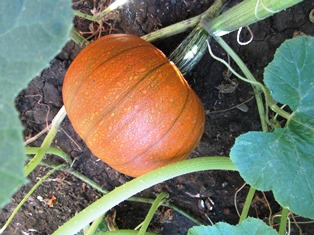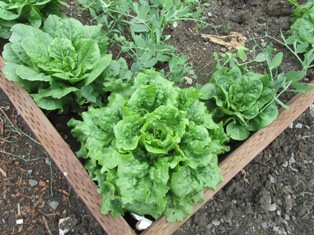Blog Archives
Don’t Put Away Your Gardening Gloves and Trowel Just Yet
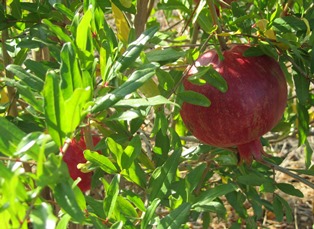
Red pomegranates hang like jewels in contrast to the lush green leaves that will soon turn yellow and drop
Autumn has a arrived. The fruit and nut trees are shedding leaves and preparing for winter dormancy. Pumpkins are taking center stage for harvest festivals and Halloween decorations. Apples have been gathered are are being peeled and cored for pies and cider making.
If you are thinking about putting away your gardening gloves and stashing your trowel and wheelbarrow, hold on a minute. It’s possible to extend the growing season from summer into autumn and even later . . . by taking a few precautions.
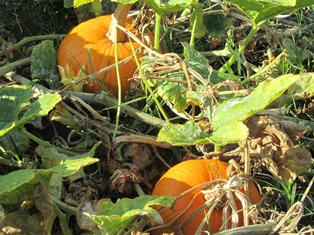
Pumpkins in my garden sport golden shades of orange and yellow, signalling arrival of the cool season
As the sun slants lower in the sky giving us shorter days, less light, and fewer hours to garden, there are some plants that will grow just fine during the cool days of fall.
However, you must select the right plants for the cool season. In addition, you’ll increase your plants’ survival rate by growing them in raised beds and boxes with good soil and aged manure. Wet them well if a cold front comes through (it’s counter-intuitive but moisture will protect their roots). Keep them warm at night with plant covers that you take off during the day when they can make the most of the sun’s warmth and light.
Consider growing some of these cool season crops: beet, bok choy, broccoli, bulb onion, chard, fava bean, garlic, green onion, kale, kohlrabi, lettuce, radish, spinach, and turnip. I’ve found many of these plants available at my local DIY garden center during the past two weeks.
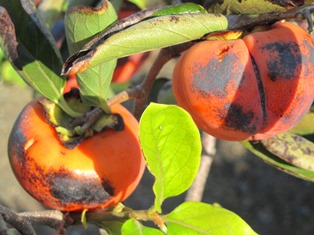
Coffee Cake, a new variety of Fuyu persimmon I’m growing will soon be ripe for picking, slicing, and serving
For November, depending on weather conditions in local microclimates, Northern California gardeners can grow fava bean, garlic, greens, leek, lettuce, onion, pea, radish, and spinach as well as some perennial herbs, especially in boxes and/or pots on the patio or in protected places such as porches.
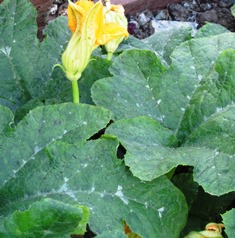
My pumpkin vines, over 25 feet long, still have numerous blooms and lemon-size green pumpkins hanging on
Because of Northern California’s mild Mediterranean climate, gardeners can enjoy cultivating plants from spring through the fall, not just during our hot summer months. If it gets too chilly for the poor honeybees to pollinate, get yourself a soft watercolor brush and do the pollination yourself.
Finally, it’s worth noting that during our rainy season, the water for the garden falls from the sky rather than from the hose. One of the many reasons not to put away the garden tools just yet.
Cool Season Plantings for Soup, Salad, and Pie
This time of year the French sugar pumpkins, persimmons and pomegranates are ready to harvest and that means it’s also time to plant cool season crops.

My summer onions formed large bulbs that I have already harvested; it’s time to replace them with bunching onions
Yesterday I turned the dirt in one of my large planting boxes, added in some aged manure and other soil amendments, and planted red and yellow onions for soups and salads during the fall and winter. I harvested seed from my summer onions and during the winter months will grow the seed in flats for spring planting.
The cool days ahead are perfect soup days and that means carrots, fennel, cilantro, cauliflower, potatoes, and bok choy will also find a place in my fall and winter garden.
In other raised beds and boxes, I’m planting heirloom lettuces, radishes, and spinach. These traditional salad ingredients are best grown during the fall or early spring as hot weather tends to make them bolt.
The pumpkins are ready for pie-making and Halloween carving. The persimmons are perfect for custards or for eating fresh when absolutely ripe (otherwise, the fruits are so tart they will make you pucker). And those lovely red pomegranate seeds are delicious eaten raw or tossed into salads.
For a list of Northern California cool seasons vegetables, check out Sunset Magazine’s edible gardening guide at http://www.sunset.com/garden/garden-basics/cool-season-crops-00400000042441/. If you plant to purchase seed f0r your own cool season garden, I urge you to choose non-genetically modified and open-pollinated seeds so that you can harvest.
 Facebook
Facebook Goodreads
Goodreads LinkedIn
LinkedIn Meera Lester
Meera Lester Twitter
Twitter





